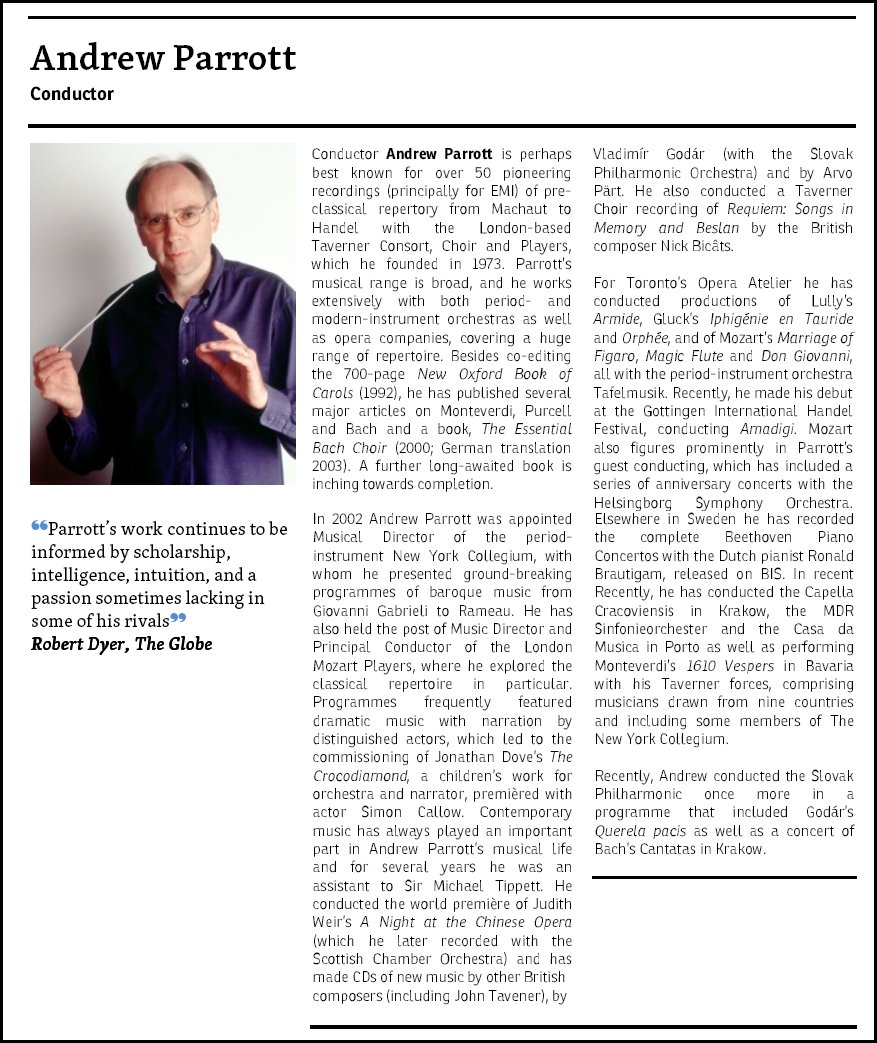

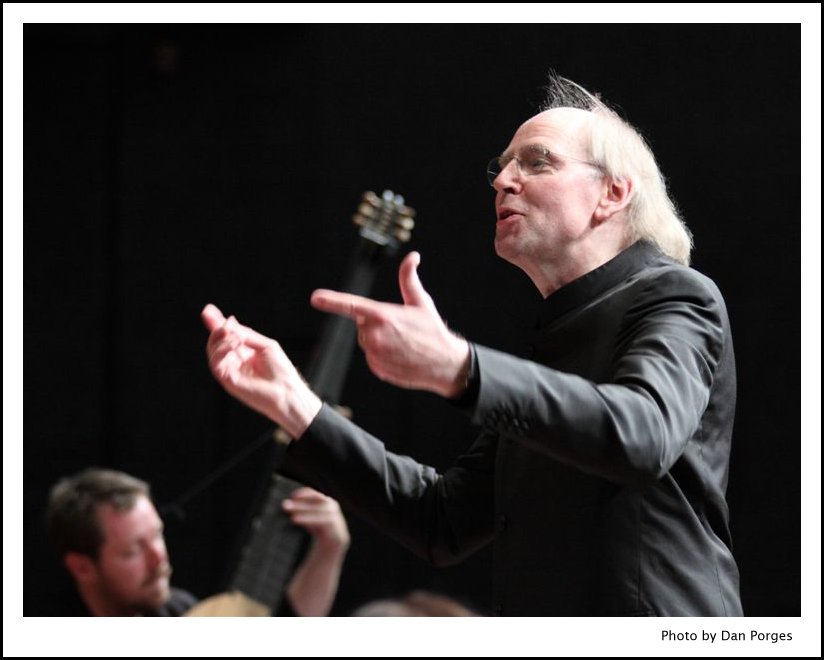 AP: I always hope
it’s in the composer’s
image. To a certain extent it probably is in my image, but
inevitably I’m not the best person to judge the
distinction between those two things. Also I do like talking
about what
there is. If all orchestras or choirs or singers round the world
were exactly the same, it would be very,
very dull. The joy is in discovering a different orchestra
which has got a different angle on the same thing. You
can’t define it. It may be that specific day or a different
acoustic. It is very difficult to pin down, but I would hate all
orchestras and all my performances to sound the same. I certainly
don’t have a blue print to which I want all performers to aspire.
Inevitably I’ve got what can seem like a clear idea of what I want, but
I hope I’m always open-minded enough to allow that to go in different
directions according to the circumstances that I find myself in.
AP: I always hope
it’s in the composer’s
image. To a certain extent it probably is in my image, but
inevitably I’m not the best person to judge the
distinction between those two things. Also I do like talking
about what
there is. If all orchestras or choirs or singers round the world
were exactly the same, it would be very,
very dull. The joy is in discovering a different orchestra
which has got a different angle on the same thing. You
can’t define it. It may be that specific day or a different
acoustic. It is very difficult to pin down, but I would hate all
orchestras and all my performances to sound the same. I certainly
don’t have a blue print to which I want all performers to aspire.
Inevitably I’ve got what can seem like a clear idea of what I want, but
I hope I’m always open-minded enough to allow that to go in different
directions according to the circumstances that I find myself in.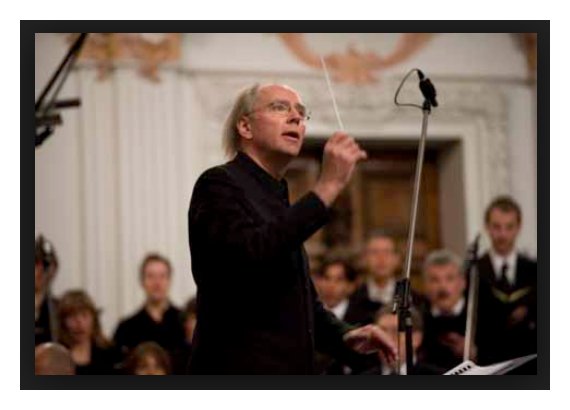 BD: Are there too
many options?
BD: Are there too
many options?| The Music for the Royal Fireworks (HWV
351) is a wind band suite composed by George Frideric Handel in 1749
under contract of George II of Great Britain for the fireworks in
London's Green Park on 27 April 1749. It was to celebrate the end of
the War of the Austrian Succession and the signing of the Treaty of
Aix-la-Chapelle in 1748. It was scored for a large wind band ensemble consisting of 24 oboes, 12 bassoons and a contrabassoon, nine natural trumpets, nine natural horns, three pairs of kettledrums, and side drums which were given only the direction to play "ad libitum"; no side drum parts were written by Handel. Handel was specific about the numbers of instruments to each written part. In the overture there are assigned three players to each of the three trumpet parts; the 24 oboes are divided 12, 8 and 4; and the 12 bassoons are divided 8 and 4. The side drums were instructed when to play in La Réjouissance and the second Menuet, but very likely also played in the Ouverture. During the preparations Handel and John Montagu, responsible for the Royal Fireworks, had an argument about adding violins. The duke made clear to Handel the King had a preference for only wind instruments and drums. Handel left out the string instruments and against his will there was also a full rehearsal of the music at Vauxhall Gardens and not in Green Park. On 21 April 1749 over twelve thousand people, each paying 2/6 (two shillings and six pence) rushed for it, causing a three-hour traffic jam of carriages on the London Bridge, the only route to the area south of the river.  Six days later, on 27 April, the performing musicians were in a specially constructed building that had been designed by Servandoni, a theatre designer, who used four Italians to assist him. Andrea Casali and Andrea Soldi designed the decorations. The fireworks themselves were devised and controlled by Gaetana Ruggieri and Giuseppe Sarti, both from Bologna. Charles Frederick was the controller, captain Thomas Desaguliers was the chief fire master. The display was not as successful as the music itself: the weather was rainy and in the middle of the show the right pavilion caught fire. Handel re-scored the suite for full orchestra and for a performance on 27 May, in the Foundling Hospital. Handel wrote notices in the score: the violins to play the oboe parts, the cellos and double basses the bassoon part, and the violas either a lower wind or bass part. The instruments from the original band instrumentation play all the movements in the revised orchestral edition except the gentle Bourrée and the first Menuet, which are played by only the oboes, bassoons, and strings alone. |
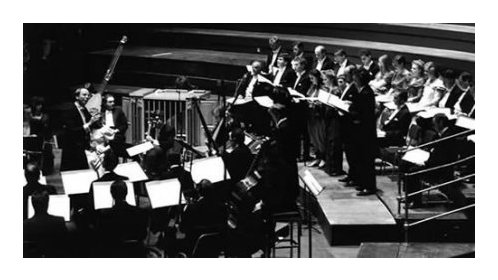 BD: Would you take
your time machine back to kidnap a Minnesinger
or Trouvère, and come
back with him now to teach us?
BD: Would you take
your time machine back to kidnap a Minnesinger
or Trouvère, and come
back with him now to teach us?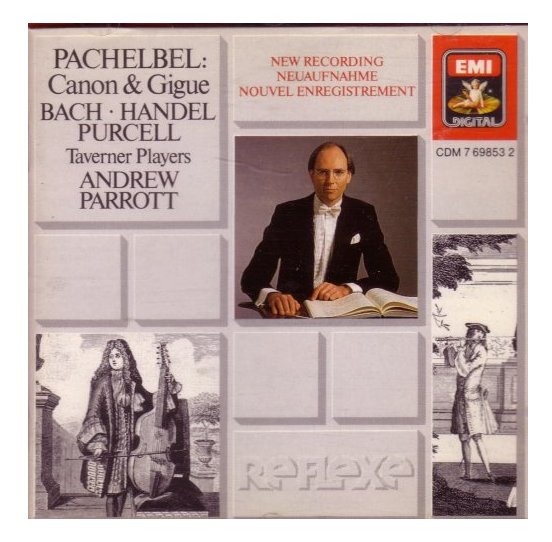 AP: Ummm...
Depends which day you ask that question on
really! I’m torn because I like being at
home and I like working on things at home. I like researching at
home. We’ve also just moved to a new home, and I want to see a
lot more of it and get it working. It’s a
wonderful old sixteenth century building, and we’ve still got cardboard
boxes everywhere At that stage it’s livable, but we haven’t
been there to live in it properly. So I don’t want to do more
work away from home than I am doing. When things are going well,
yes, I love being in different places, though it’s often frustrating
that I don’t really get to see those places. I get to see the
inside of hotel rooms of one type or another, and it’s heads down to
work. But what I do like is that when I’m away I can concentrate
fully on the job in hand. At home there are so many
distractions. The telephone’s going all the time, and I’m meant
to be planning things as well as doing the washing and all sorts of
mundane domestic things. I do not regard success as being a
full diary, if that is what your question implies. Some musicians
regard themselves as failures if they’ve got a blank week in the
year. That is not my feeling. There are musicians who
really do love
traveling around, jumping on planes, jumping off planes into
rehearsals, doing concerts and then dashing off to another plane.
There’s nothing beautiful about airplanes or airports, even the
finest airports. I like being in places. I like
old-fashioned travel — not that there’s time to
do that by train or coach where you’d see
something. Does one really earn the right to be in a place if
you’re just
hermetically sealed and posted off to another place? You
don’t really feel you’ve traveled; you just are in
different places. But I like the old-fashioned traveling, which I
used to do through Switzerland on a regular visit to St
Moritz — believe it or
not for musical purposes, rather than skiing
purposes. Just that two- or three-hour journey down
from Zurich through the mountains. It’s absolutely bliss.
You
really get a feeling of Switzerland that you wouldn’t do if you were
just dropped there and taken to an anonymous hotel in one easy stage.
AP: Ummm...
Depends which day you ask that question on
really! I’m torn because I like being at
home and I like working on things at home. I like researching at
home. We’ve also just moved to a new home, and I want to see a
lot more of it and get it working. It’s a
wonderful old sixteenth century building, and we’ve still got cardboard
boxes everywhere At that stage it’s livable, but we haven’t
been there to live in it properly. So I don’t want to do more
work away from home than I am doing. When things are going well,
yes, I love being in different places, though it’s often frustrating
that I don’t really get to see those places. I get to see the
inside of hotel rooms of one type or another, and it’s heads down to
work. But what I do like is that when I’m away I can concentrate
fully on the job in hand. At home there are so many
distractions. The telephone’s going all the time, and I’m meant
to be planning things as well as doing the washing and all sorts of
mundane domestic things. I do not regard success as being a
full diary, if that is what your question implies. Some musicians
regard themselves as failures if they’ve got a blank week in the
year. That is not my feeling. There are musicians who
really do love
traveling around, jumping on planes, jumping off planes into
rehearsals, doing concerts and then dashing off to another plane.
There’s nothing beautiful about airplanes or airports, even the
finest airports. I like being in places. I like
old-fashioned travel — not that there’s time to
do that by train or coach where you’d see
something. Does one really earn the right to be in a place if
you’re just
hermetically sealed and posted off to another place? You
don’t really feel you’ve traveled; you just are in
different places. But I like the old-fashioned traveling, which I
used to do through Switzerland on a regular visit to St
Moritz — believe it or
not for musical purposes, rather than skiing
purposes. Just that two- or three-hour journey down
from Zurich through the mountains. It’s absolutely bliss.
You
really get a feeling of Switzerland that you wouldn’t do if you were
just dropped there and taken to an anonymous hotel in one easy stage.|
[This is a group of reviews about
Andrew Parrott from various Chicago newspapers. Each one has been
slightly edited.]
A Welcome Guest Plays Host To Grant Park Music Fete July 27, 1987|Chicago Tribune By Howard Reich. It takes a conductor of quite some craft to effectively dispatch a program as demanding as the one offered Saturday evening by the Grant Park Symphony Orchestra, Chorus and soloists. That Andrew Parrott, guest conducting at Grant Park, was able to make this evening of Schubert, Haydn and Tippett a success says a good deal about his abilities, as well as those of the participating musicians. Schubert`s masses are not frequently performed, but the lyric beauty of his Mass No. 5 in A-flat (D. 678) makes one wish that weren`t the case. Its pages are filled with elegantly wrought exchanges between four soloists and chorus, vividly colored orchestral writing and choral passages of simplicity as well as grandeur. Parrott made the most of these attributes, drawing from the chorus, in particular, long-spun phrases shaped as carefully as if sung by a single artist. The dialogue between soloists and choristers was clear in enunciation and impeccable in its matching of colors (Grant Park Chorus conductor Thomas Peck obviously had prepared his singers well). Though Parrott is known for his work with early music, this reading--built on dramatic contrasts and richly expressive singing--clearly bore the mark of the romantic era. Yet the performance also had a welcome clarity of line and texture. Michael Tippett`s Ritual Dances from ``The Midsummer Marriage,`` the English composer`s first opera, is an orchestral virtuoso-piece imbued with complex cross-rhythms and a nearly Impressionistic wash of colors. Parrott, who opted to cut the choral portions of the work, fashioned a dynamic performance with considerable rhythmic drive and his characteristic clarity of sound. Most important, he inspired the musicians of the Grant Park Symphony to play at the peak of their ability; the result was as exciting as it was technically impressive. Parrott opened the program with Haydn`s ``Te Deum`` No. 2, in C Major, in a reading that immediately indicated the conductor`s gifts for balancing orchestral and choral sonorities. *
* *
* *
Review in The Reader by Dennis Polkow, July 20, 1989 Grant Park manager and artistic director Steven Ovitsky has consistently tried to bring in early-music conductors to lead programs of early repertoire, and though the results have been mixed, he is to be congratulated for taking the risk. Luckily we had the case with Andrew Parrott's Saturday night concert, which included Beethoven's first piano concerto, with soloist Hung-Kuan Chen, and his complete music for Egmont. The program began auspiciously, with some music of the virtually forgotten Italian classicist Luigi Cherubini, the overture to his opera Medee, based on the sorceress Medea from Greek mythology. The orchestra's ensembling was tight, despite Parrott's using a full orchestra (presumably for projection, which makes great sense when you are performing outside and sound slips away into the night); the phrasing was beautifully done, and balances were carefully nuanced, although Parrott's tempo was surprisingly slow. Things picked up radically for the second part of the program, which began with Beethoven's Egmont Overture at a nice clip, although without the heightening tension and drama typical of more Romantic interpretations. Parrott's modus operandi was to emphasize the Classical roots of this music rather than its emerging Romanticism, and while I find the former an interesting approach (Parrott is certainly one of the best exponents of it), it is less satisfying to me than the latter. Parrott's is a nice and pretty Beethoven, not an "over the edge" interpretation that shows Beethoven's more revolutionary and avant-garde qualities. The attacks and entrances were clean and precise, although again, Parrott seemed to be holding back a bit tempo-wise, presumably because he prefers accuracy to speed and was concerned that the orchestra couldn't have kept up with him. (I suspect he was right.) Following the familiar overture was a performance of virtually the complete incidental music that Beethoven wrote for Goethe's play Egmont, a historical fiction concerning the 16th-century Flemish count who led a resistance movement against Spanish rule and became a martyr in the cause of freedom. The pieces, including two lovely and rarely heard songs for Egmont's beloved Clarchen (nicely sung by an overmiked Diane Ragains), were connected by a summary of what goes on in the play, cleverly adapted by radio dramatist Yuri Rasovsky and convincingly narrated by Chicago actor Joe van Slyke. Van Slyke also took the role of the count for the rousing finale, in which, to Beethoven's heroic strains, he calls out that his blood shall free the land from Spanish occupation, and encourages his countrymen to follow him to glory. *
* *
* *
Review in The Reader by Dennis Polkow, August 2, 1990 Conductor Andrew Parrott is not as much of a household name as many of his less-deserving early-music colleagues. Yet he was one of the movement's earliest and most experimental pioneers, and he remains one of its guiding lights. The Parrott-conducted Grant Park programs are always among the most interesting of the year, not only because they spotlight unusual repertoire, but also because they give us a fresh perspective on more familiar works. This year's program combined two relatively unknown works, Beethoven's ballet The Creatures of Prometheus and a work by the little-known Czech Baroque master Georg Benda, Medea. Medea is a melodrama for actors and orchestra that was adapted by Chicago radio dramatist Yuri Rasovsky (who so cleverly brought Egmont to life during Parrott's last appearance here). Actress Andrea Marcovicci and actor Kristoffer Tabori took the speaking roles of Medea and Jason and were mostly convincing when they weren't screaming at the audience. The music is pretty forgettable, but Parrott made sure that the orchestra (scaled down to chamber proportions) had the proper Baroque energy and spirit and that it played up to tempo with clean ensembling and lyrical phrasing. Certainly a worthwhile enterprise. Parrott made the best case I've ever heard for the much-neglected The Creatures of Prometheus. Unlike The Rite of Spring, for instance, which is such a monumental piece of music that dance becomes a distraction, this doesn't stand well on its own. Still, the music can be very enjoyable. It is early Beethoven (of the period of the First and Second symphonies), and Parrott's elegant and Classical phrasing perfectly suited it. The playing of the orchestra was as refined as I have ever heard it, with extraordinary attention paid to ensembling and balancing. *
* *
* *
Part of a Letter-to-the-Editor from a member of the Grant Park Symphony in The Reader, August 30, 1990 Andrew Parrott is refreshing to work with; he's a conductor who truly has something to say about style, is passionate about it, and challenges the orchestra to really play, even if they don't all share his approach. *
* *
* *
Grant Park Symphony Excels At Age-old Repertoire By Howard Reich, Entertainment Writer, Chicago Tribune. July 11, 1989 Can a conductor who specializes in early music express his message with a modern symphony orchestra? Certainly Andrew Parrott can, judging by his striking performances over the weekend leading the Grant Park Symphony Orchestra. Parrott, a longtime scholar/performer of 17th and 18th Century repertoire, put together an unusual program and inspired the orchestra to play it with finesse and authority. Though the Grant Park Symphony obviously did not sound like a period-instrument orchestra (the musicians were playing standard, modern instruments), the performances bristled with more clarity and transparency than we are accustomed to hearing. The careful balances and meticulous interplay among the orchestra`s sections clearly reflected Parrott`s influence. Beyond such touches, however, Parrott is a dynamic conductor whom these musicians obviously respect. They heeded even his most ebullient tempos. They gave him precisely the tonal shades he wished. Apart from questions of historical authenticity, this was an exciting performance that showed the orchestra playing at the top of its form. The evening`s rarity was Beethoven`s complete incidental music for Goethe`s ``Egmont`` (concertgoers are more accustomed to hearing only the overture). Because so much of this music serves as dramatic punctuation-with brief orchestral utterances here and there-a narration was written by writer/ broadcaster Yuri Rasovsky. The beautifully crafted text summed up Goethe`s text in quick, telegraphic phrases that held the music together without overwhelming it. Chicago actor Joe Van Slyke, a charismatic performer, delivered the story of ``Egmont`` at Saturday evening`s performance with an appropriately melodramatic air. Parrott and his players kept the orchestral sound thundering without obscuring Van Slyke`s reading. And soprano Diane Ragains compensated for a smallish voice with a dramatically alert interpretation. Parrott opened the evening with Cherubini`s overture to the opera ``Medee,`` in a performance that was exuberant from first note to last. The concert also was important for the Chicago debut of pianist Hung-Kuan Chen, whose appearance was made possible by the Xerox Affiliate Artist Program (which gives young artists performing opportunities across the country). Chen proved more than worthy of this honor, offering a performance of Beethoven`s First Piano Concerto that was by turns subtle in lyric passages and propulsive in fast-moving ones. He brought long-lined poetry to the slow movement (particularly in light of the usual outdoor distractions) and sharp wit to the finale. Parrott`s orchestral accompaniment was nearly intuitive in its ability to anticipate the soloist. *
* *
* *
Parrott Brings Alive 2 Works Of Mythology July 12, 1990|By John von Rhein, Music critic, Chicago Tribune Wednesday at the Petrillo Music Shell, the Grant Park Symphony under British conductor Andrew Parrott gave us two seldom-heard pieces of theater music from the Classical period, both on mythological subjects. One of these, Georg Benda`s scenic melodrama, ``Medea`` (1775), is so rarely done, in fact, that the performance represented an American premiere. Georg (or Jiri, to revert to his Czech name) Benda was one of the most celebrated composers of a musical dynasty famous throughout Europe for more than a century. His melodramas-works that combined music and speech-were considered highly innovative in their day, admired by no less a judge than Mozart before the genre fell out of fashion. Benda, alas, was no Mozart, but a perfectly competent 18th Century mediocrity who wrote in a style somewhere between C.P.E. Bach and Gluck, though not nearly as distinctive. His music, if ``Medea`` is a fair example, is well made and agreeable to hear but it leaves the mind the second it`s over. (In one recurring theme associated with Medea`s grief, listeners will note an anticipation of the Funeral March from Beethoven`s Third Symphony. Did Beethoven, I wonder, know ``Medea``?) And the contrast in tone between the politeness of Benda`s generic classicism and the bloody tragedy it is supposed to depict is often disorienting, if not risible. That said, one must credit Parrott and Yuri Rasovsky (who both directed and prepared the English concert text) for presenting a deeply flawed rarity in the best possible light. Rasovsky`s achievement was to strip the original German text of stilted pomposity, giving us a lyrical and direct presentation of the tragedy. If certain archaisms remain (at one point Medea cries, ``Mercury, guide me to the Stygian shore``), at least they do not contradict Benda`s own archaic conceits. Bringing a wealth of experience gained from period performances of the preclassical repertory, Parrott kept everything moving with buoyant rhythms and clean, well-balanced textures that allowed the words to project clearly. Parrott devoted the second half of his program (to be repeated Friday night) to Beethoven`s ``Creatures of Prometheus`` ballet music. The overture is well-known, and the finale is a set of variations on a theme Beethoven more famously used in his ``Eroica`` Symphony. Not all of this music (there are 16 dances in all, some quite brief) is from the composer`s top drawer, but all of it is charming, lively and varied . There were several delightful solos which gave various principal players a chance to shine. But the real hero of the occasion was Parrott. I can`t wait to hear what this superb musician will bring us next year at the park. |
© 1990 Bruce Duffie
This conversation was recorded in Chicago on July 12, 1990. Portions were broadcast on WNIB in 1997. This transcription was made in 2015, and posted on this website at that time. My thanks to British soprano Una Barry for her help in preparing this website presentation.
To see a full list (with links) of interviews which have been transcribed and posted on this website, click here.
Award - winning broadcaster Bruce Duffie was with WNIB, Classical 97 in Chicago from 1975 until its final moment as a classical station in February of 2001. His interviews have also appeared in various magazines and journals since 1980, and he now continues his broadcast series on WNUR-FM, as well as on Contemporary Classical Internet Radio.
You are invited to visit his website for more information about his work, including selected transcripts of other interviews, plus a full list of his guests. He would also like to call your attention to the photos and information about his grandfather, who was a pioneer in the automotive field more than a century ago. You may also send him E-Mail with comments, questions and suggestions.